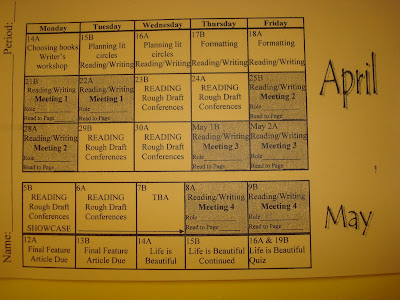This permission slip (below) was sent home on Monday and Tuesday with a quick due date of Wednesday and Thursday. If you;ve lost your letter, print this out and get it signed instead. We can't wait to jump into another round of literature circles.We will soon begin another round of literature circles. This time, our study will focus on historical fiction. Reading novels from specific historical periods provides an excellent opportunity to study setting, characterization, and plot development while broadening their understanding of social issues and historical events. Your student will have the choice of several middle-school appropriate titles from a variety of historical periods that include slavery, the Holocaust, the Civil Rights movement, as well as periods of disease, poverty, or war. We are requesting your permission for your student to read one of these books. There is some mature language used as each writer attempts to accurately portray the historical events of each period. These books are all in circulation in middle school media centers and at the public library. We will be discussing the writer’s choices of language and the events of the novels with each group. The titles of the books are listed below. Different classes will have access to different choices based on availability and reading levels.
Across Five Aprils, Irene Hunt
A War Torn Sky, L.M. Elliott
A Tree Grows in Brooklyn, Bette Smith
Fever 1793, Laurie Halse Anderson
My Brother Sam is Dead, James L. Collier/Christopher Collier
My Name is Asher Lev, Chaim Potok
Roll of Thunder, Hear My Cry, Mildred Thompson
Soldier Boys by Dean Hughes
Soldier X by Don Wulffman
The Devil’s Arithmetic by Jane Yolen
The Glory Field, Walter Dean Myers
The House of Dies Drear, Virginia Hamilton
To Kill A Mockingbird, by Harper Lee
The Year of the Hangman, Gary Blackwood
We will also watch a film that enhances our reading and gives us the chance to meet the state standards in speaking, listening, and viewing. Many literary techniques are easily observed in the “text” of a film. The film we would like to show is Life is Beautiful (La Vita E Bella), an Italian film that won three Academy awards--best actor, best foreign film, best music (for Nicola Piovani’s original dramatic score). In this film, an Italian man chooses to hide the atrocities of the Holocaust from his young son by pretending that they are playing an elaborate game. His intention is to ensure that, for his son, life will always be beautiful. Much of the movie actually takes place in Italy, developing the main character and showing the love and happiness of their family before they are sent to the concentration camp. It is rated PG-13 for Holocaust-related thematic elements but because it is often viewed through the eyes of a child, there are not graphic depictions of violence or death. In the past, our students have been moved by this powerful and sensitive movie. We hope that you will trust us to discuss these issues thoughtfully and professionally. We have attended special workshops to ensure that our teaching of Holocaust issues is appropriate and sensitive. Please call us if you would like more information about the film. It is readily available at any video store or the public library if you would like to preview it yourself.
My child, _________________________________________, (student name) may read the books and view the movie for the Historical Fiction Literature Circle Study.
Parent/Guardian Name: _________________________________________ (please print)
Parent/Guardian Signature: ______________________________________
If you have concerns or reservations, please contact your child’s Language Arts teacher at the extensions or e-mails listed below. We can answer your questions and make recommendations about alternate choices for your student. Please return this part of the form by April 9th (b day)and 10th (a day), 2008.
Sincerely,
Mrs. Izzo and Mrs. Jackson


